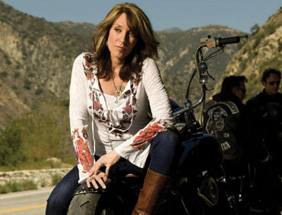|
|
Mythology: Sons of AnarchyBy Martin FelipeSeptember 8, 2010
Much like The Simpsons' Springfield, the show takes place in a fictional town called Charming, filled with singular characters and places. It’s a somewhat self-contained little universe that spills out into surrounding Northern California. The Sons of Anarchy run this town, and we’re privy to the way this all operates. We see how the gang interacts with the law, with the townspeople and with each other. We also see how they relate to neighboring gangs and criminal syndicates. If The Sopranos represents a white-collar mob, the elite of the organized crime world, Sons of Anarchy are the working class mobsters. There are, of course, differences between the two. Though violence abounds in both worlds, the Sons seem more amenable to working things out through negotiation. They also seem to really run the small town. While Tony Soprano and his people have infiltrated the law, the Sons own it. In addition, where it seem like the Sons have each other's backs, the Sopranos have to always watch theirs. That’s not to say that there’s no violence. Snitching, the most unforgivable of sins, seems like something motorcycle gangs punish the same way gangsters do. In an effort to avenge some presumed snitchery, Tig unwittingly kills Opie’s wife. For that matter, Clay, the patriarch of the gang, seems to have something to do with the death of Jax’s father’s death. The rules may be more forgiving than those of the mafia, but killing is far from unheard of. The ill doings surrounding Jax’s father’s death lead me to another fascinating aspect of the show. There is a rich history to this club, a history that unravels as the show evolves. We learn more about the nature of the gang, the rules, ethics, mission. We get an ever-widening view of whom these characters are, how they relate, and the betrayals that lead to where they are now. It’s a rough and tumble world, yet a compelling one. I admit it; I don’t know if this is what a real motorcycle club is like. The important thing is that it feels true, it feels real. It’s a world so unique and off the beaten path that to create an entire show around it is something we might not have seen in the era of network television dominance. And that’s too bad. While this may be Hamlet, and the themes may be familiar, the gang mythology isn’t. That’s what sets it apart, what raises it to its own unique level. Don’t get me wrong; it’s a great show, no matter what the setting. The themes are universal. Bottom line, however, is that if it really is Hamlet, what makes it different than any other Hamlet is the mythology of the motorcycle gang. This is the beauty of the rise in cable programming. We get to see life amongst new groups, different ways of life. There’s always another doctor show, but there isn’t another Sons of Anarchy.
|

|
|
|

|
Friday, November 1, 2024
© 2024 Box Office Prophets, a division of One Of Us, Inc.


